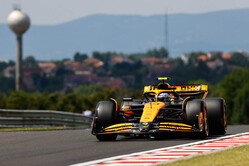


19/07/2024
NEWS STORY
 Lando Norris was quickest come the end of the first day of the Hungarian Grand Prix.
Lando Norris was quickest come the end of the first day of the Hungarian Grand Prix.
The English McLaren driver was the only one to get under the 1'18" barrier with a best time of 1'17"788 in the second session. Behind him were Red Bull Racing's Max Verstappen (1'18"031) and Ferrari's Carlos Sainz (1'18"185). The Spaniard had been quickest in the first session with a lap in 1'18"713, followed by Verstappen (1'18"989) and Charles Leclerc in the other Ferrari (1'19"011). FP2 had to be red flagged and the session stopped for 16 minutes, following a spectacular accident for Leclerc.
Friday in Budapest saw the third highest recorded track temperature since Pirelli returned to Formula 1 in 2011. The 59.7 °C seen in FP1 has only been surpassed by the 60 °C at the 2018 Hungarian Grand Prix and the 61 °C in the first free practice at the 2016 Malaysian Grand Prix.
There was a significant difference of between 10 and 15 °C between the temperatures in today's two sessions, exaggerated by partial cloud cover in the second hour. It's an important piece of data to keep in mind when analysing today's data, also in light of the fact that tomorrow's qualifying starts at 16.00 and the race on Sunday at 15.00, even if the weather forecast is for a slight drop in air temperature for tomorrow before seeing a repeat of today's figures for Sunday.
As for tyre use, one important consideration concerns the Hard, which today was only used by Ferrari and Aston Martin in FP1 and by McLaren in FP2. It means that these three teams now only have one set of this specification available for the race, when it is obligatory to have at least one set of Medium and one of Hard. From what has been seen so far, the C3 looks like the most competitive compound, especially over a long run.
Simone Berra - Chief Engineer: "As expected, it was a very hot day. Honestly, there was nothing particularly surprising about this first day of track activity. The three compounds behaved as expected from the simulations, with the C3 and the C4 seemingly the best suited for a race in which thermal degradation will be the key factor. The C5, clearly quicker over a flying lap, with a performance difference to the C4 of around 6 to 7 tenths, will need to be managed carefully in order to extract all its potential.
"Track evolution was significant during the first session, although the track was actually in good condition from the start. The drop in track temperature led to a noticeable reduction in lap time from one session to the other. Furthermore, there was a significant impact on car balance, with degradation more marked on the front compared to the first session.
"Analysing the times over the long runs, one has to consider that drivers and teams adopted different approaches in terms of tyre management: some preferred to have a cautious start to their run before pushing toward the end, while others pushed hard from the start in order to see what the level of degradation might be like in more extreme conditions."
Check out our Friday gallery from the Hungaroring here.